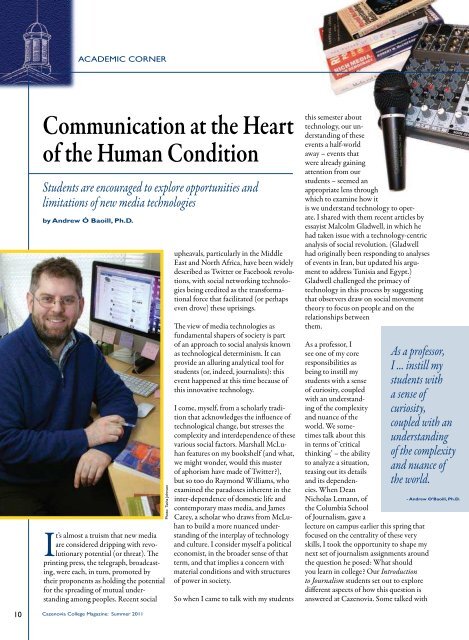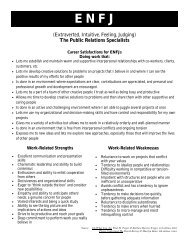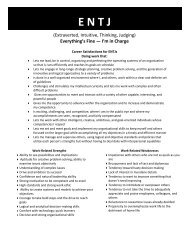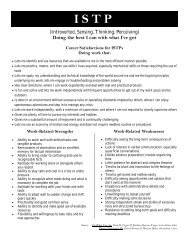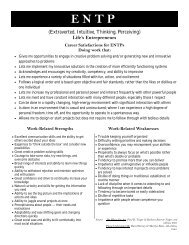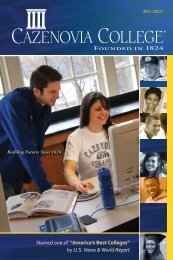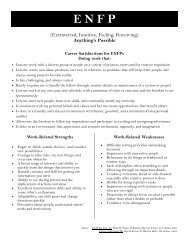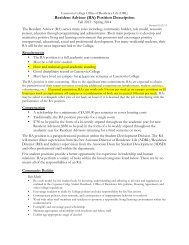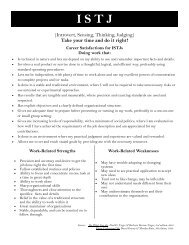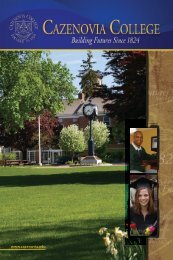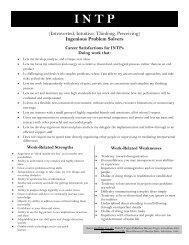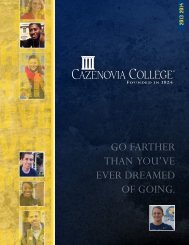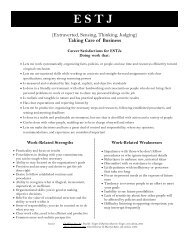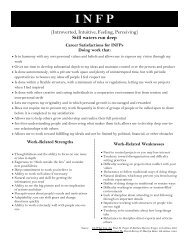And the Emmy® Goes to..
Spring/Summer 2011 - Cazenovia College
Spring/Summer 2011 - Cazenovia College
- No tags were found...
You also want an ePaper? Increase the reach of your titles
YUMPU automatically turns print PDFs into web optimized ePapers that Google loves.
ACADEMIC CORNER<br />
Communication at <strong>the</strong> Heart<br />
of <strong>the</strong> Human Condition<br />
Students are encouraged <strong>to</strong> explore opportunities and<br />
limitations of new media technologies<br />
by <strong>And</strong>rew Ó Baoill, Ph.D.<br />
It’s almost a truism that new media<br />
are considered dripping with revolutionary<br />
potential (or threat). The<br />
printing press, <strong>the</strong> telegraph, broadcasting,<br />
were each, in turn, promoted by<br />
<strong>the</strong>ir proponents as holding <strong>the</strong> potential<br />
for <strong>the</strong> spreading of mutual understanding<br />
among peoples. Recent social<br />
Pho<strong>to</strong>: Tasha Johnson<br />
upheavals, particularly in <strong>the</strong> Middle<br />
East and North Africa, have been widely<br />
described as Twitter or Facebook revolutions,<br />
with social networking technologies<br />
being credited as <strong>the</strong> transformational<br />
force that facilitated (or perhaps<br />
even drove) <strong>the</strong>se uprisings.<br />
The view of media technologies as<br />
fundamental shapers of society is part<br />
of an approach <strong>to</strong> social analysis known<br />
as technological determinism. It can<br />
provide an alluring analytical <strong>to</strong>ol for<br />
students (or, indeed, journalists): this<br />
event happened at this time because of<br />
this innovative technology.<br />
I come, myself, from a scholarly tradition<br />
that acknowledges <strong>the</strong> influence of<br />
technological change, but stresses <strong>the</strong><br />
complexity and interdependence of <strong>the</strong>se<br />
various social fac<strong>to</strong>rs. Marshall McLuhan<br />
features on my bookshelf (and what,<br />
we might wonder, would this master<br />
of aphorism have made of Twitter?),<br />
but so <strong>to</strong>o do Raymond Williams, who<br />
examined <strong>the</strong> paradoxes inherent in <strong>the</strong><br />
inter-dependence of domestic life and<br />
contemporary mass media, and James<br />
Carey, a scholar who draws from McLuhan<br />
<strong>to</strong> build a more nuanced understanding<br />
of <strong>the</strong> interplay of technology<br />
and culture. I consider myself a political<br />
economist, in <strong>the</strong> broader sense of that<br />
term, and that implies a concern with<br />
material conditions and with structures<br />
of power in society.<br />
So when I came <strong>to</strong> talk with my students<br />
this semester about<br />
technology, our understanding<br />
of <strong>the</strong>se<br />
events a half-world<br />
away – events that<br />
were already gaining<br />
attention from our<br />
students – seemed an<br />
appropriate lens through<br />
which <strong>to</strong> examine how it<br />
is we understand technology <strong>to</strong> operate.<br />
I shared with <strong>the</strong>m recent articles by<br />
essayist Malcolm Gladwell, in which he<br />
had taken issue with a technology-centric<br />
analysis of social revolution. (Gladwell<br />
had originally been responding <strong>to</strong> analyses<br />
of events in Iran, but updated his argument<br />
<strong>to</strong> address Tunisia and Egypt.)<br />
Gladwell challenged <strong>the</strong> primacy of<br />
technology in this process by suggesting<br />
that observers draw on social movement<br />
<strong>the</strong>ory <strong>to</strong> focus on people and on <strong>the</strong><br />
relationships between<br />
<strong>the</strong>m.<br />
As a professor, I<br />
see one of my core<br />
responsibilities as<br />
being <strong>to</strong> instill my<br />
students with a sense<br />
of curiosity, coupled<br />
with an understanding<br />
of <strong>the</strong> complexity<br />
and nuance of <strong>the</strong><br />
world. We sometimes<br />
talk about this<br />
in terms of ‘critical<br />
thinking’ – <strong>the</strong> ability<br />
<strong>to</strong> analyze a situation,<br />
teasing out its details<br />
and its dependencies.<br />
When Dean<br />
Nicholas Lemann, of<br />
<strong>the</strong> Columbia School<br />
of Journalism, gave a<br />
As a professor,<br />
I ... instill my<br />
students with<br />
a sense of<br />
curiosity,<br />
coupled with an<br />
understanding<br />
of <strong>the</strong> complexity<br />
and nuance of<br />
<strong>the</strong> world.<br />
lecture on campus earlier this spring that<br />
focused on <strong>the</strong> centrality of <strong>the</strong>se very<br />
skills, I <strong>to</strong>ok <strong>the</strong> opportunity <strong>to</strong> shape my<br />
next set of journalism assignments around<br />
<strong>the</strong> question he posed: What should<br />
you learn in college? Our Introduction<br />
<strong>to</strong> Journalism students set out <strong>to</strong> explore<br />
different aspects of how this question is<br />
answered at Cazenovia. Some talked with<br />
- <strong>And</strong>rew O’Baoill, Ph.D.<br />
professors about aspects of <strong>the</strong>ir work:<br />
building syllabi, running classes.<br />
O<strong>the</strong>rs examined extra-curricular<br />
activities. Still o<strong>the</strong>rs asked broader<br />
structural questions: why do we have a<br />
general education curriculum? What<br />
role do majors play, and how does <strong>the</strong><br />
educational experience differ between<br />
various majors?<br />
In building this task we were able <strong>to</strong><br />
build on a significant campus event,<br />
providing an opportunity <strong>to</strong> interrogate<br />
<strong>the</strong> arguments put forward by Lemann,<br />
and <strong>to</strong> work <strong>to</strong>ge<strong>the</strong>r <strong>to</strong> build a set of responses<br />
<strong>to</strong> Lemann’s challenge. We were<br />
thus critically and actively engaged in<br />
examining this call <strong>to</strong> critical thinking,<br />
a form of meta-analysis that is pleasing<br />
in its symmetry. Perhaps as significantly,<br />
<strong>the</strong> assignment provided a means for<br />
students <strong>to</strong> see <strong>the</strong>ir own work contributing<br />
<strong>to</strong> <strong>the</strong> work of <strong>the</strong> whole, without<br />
needing <strong>to</strong> encapsulate <strong>the</strong> whole within<br />
each individual work. No student’s piece<br />
was going <strong>to</strong> provide a comprehensive<br />
answer <strong>to</strong> <strong>the</strong> question, but when set <strong>to</strong>ge<strong>the</strong>r<br />
<strong>the</strong> collection of studies provided<br />
some useful insights.<br />
This, in many ways, is <strong>the</strong> way much<br />
intellectual labor, be it scholarship or<br />
journalism, operates – each piece working<br />
with an open-ended set <strong>to</strong> create a<br />
collage of meaning and insight. When<br />
we speak of journalism as a first draft of<br />
his<strong>to</strong>ry, we can point <strong>to</strong> iconic headlines<br />
that trumpet out new-found truths, but<br />
<strong>the</strong>re’s also <strong>the</strong> hum-drum background<br />
noise, <strong>the</strong> montage of news s<strong>to</strong>ries and<br />
experiences that serve <strong>to</strong> build our<br />
understanding of <strong>the</strong> ‘public’ world. It is<br />
a rare contribution that stands alone in<br />
shaping our understanding of <strong>the</strong> world.<br />
Our Communication Studies students<br />
learn about <strong>the</strong> collaborative nature of<br />
<strong>the</strong> creative process, <strong>the</strong> hybridity inherent<br />
in cultural practice, and consider<br />
<strong>the</strong> role of copyright law, <strong>the</strong> fair use<br />
doctrine, media institutions and social<br />
movements, in shaping our capacity <strong>to</strong><br />
cooperate with o<strong>the</strong>rs, build on prior<br />
art, and come <strong>to</strong> better understand our<br />
social world.<br />
Communication Studies is relatively<br />
young as an academic field in its current<br />
form, but has roots that run deep, back<br />
<strong>to</strong> Aris<strong>to</strong>tle’s rhe<strong>to</strong>ric. In its techniques<br />
and intellectual traditions it has overlap<br />
with <strong>the</strong> humanities and social sciences,<br />
from literary studies <strong>to</strong> psychology, from<br />
sociology <strong>to</strong> economics. The claim that<br />
communication is at <strong>the</strong> heart of <strong>the</strong><br />
human condition is a bold one that gives<br />
a unifying focus for scholars engaged in<br />
work as varied as textual analysis, study<br />
of <strong>the</strong> efficacy of health communication,<br />
cultural analysis, and policy studies.<br />
Here at Cazenovia we provide a broad<br />
grounding in <strong>the</strong> field, one that suits <strong>the</strong><br />
College’s approach <strong>to</strong> merging <strong>the</strong>ory<br />
and practice, intellectual engagement<br />
and professional preparation. The<br />
program contributes <strong>to</strong> <strong>the</strong> College’s<br />
general education program, providing<br />
courses in oral literacy, such as Debate<br />
and Public Speaking, and students in<br />
our major take additional classes <strong>to</strong><br />
streng<strong>the</strong>n this important competency.<br />
We provide courses that cover <strong>the</strong> gamut<br />
of communication <strong>the</strong>ory, an area that<br />
covers study of interpersonal and group<br />
communication in a range of contexts.<br />
Finally, we provide study and practical<br />
experience in mediated communication,<br />
with classes in areas such as broadcasting<br />
and journalism.<br />
It is in this last area that my own teaching<br />
is focused. We have been privileged,<br />
over <strong>the</strong> past few years, <strong>to</strong> receive some<br />
significant grant support for audiovisual<br />
equipment, and our students are<br />
now able <strong>to</strong> gain experience with media<br />
creation not only in print journalism and<br />
radio, but in video and audio production,<br />
and we have begun experimenting<br />
this past year with Internet-based distribution<br />
of student work. This provides<br />
opportunities for students <strong>to</strong> build practical<br />
skills in an expanded range of areas.<br />
It also provides new avenues <strong>to</strong> explore<br />
with our students <strong>the</strong> differing rhe<strong>to</strong>rical<br />
contexts of <strong>the</strong>se varied spaces, and <strong>the</strong> opportunities<br />
and limitations of new media<br />
technologies, both here on campus and for<br />
revolutions a half-world away.<br />
About <strong>the</strong> Author:<br />
Dr. O’Baoill<br />
offers<br />
assistance<br />
<strong>to</strong> Courtney<br />
Murray and<br />
stresses<br />
how <strong>to</strong>day’s<br />
students are<br />
gaining more<br />
experience<br />
in video<br />
and audio<br />
production<br />
<strong>And</strong>rew Ó Baoill , assistant professor<br />
of Communication Studies, joined<br />
<strong>the</strong> faculty in 2009, teaching courses in<br />
broadcasting and journalism. He is <strong>the</strong><br />
faculty advisor for Wildcat Radio, WITC-<br />
FM88.9; and The Quad, Cazenovia’s<br />
student newspaper.<br />
He earned a bachelor of science degree<br />
from <strong>the</strong> National University of Ireland in<br />
Galway, a master’s degree in communications<br />
and cultural studies from Dublin<br />
City University, and a doc<strong>to</strong>ral degree in<br />
communications and media studies from<br />
<strong>the</strong> University of Illinois.<br />
Dr. Ó Baoill’s research is generally focused<br />
on <strong>the</strong> interaction of technology, democracy,<br />
and public participation. He has had<br />
extensive experience as a radio station manager<br />
and producer, and has made numerous<br />
media appearances and given interviews<br />
on <strong>the</strong> relationship between media and<br />
society.<br />
He was awarded an Illinois Distinguished<br />
Fellowship and various University of Illinois<br />
Fellowships, and was an appointed<br />
member of <strong>the</strong> Irish government’s Broadcasting<br />
Complaints Commission from<br />
1997-2000. He is a member of <strong>the</strong> Association<br />
of Internet Researchers (AoIR);<br />
<strong>the</strong> International Association for Media<br />
and Communication Research (IAMCR);<br />
<strong>the</strong> International Communications Association<br />
(ICA); <strong>the</strong> Irish Media Research<br />
Network; and Radio Research Ireland.<br />
10 Cazenovia College Magazine: Summer 2011 Cazenovia College Magazine: Summer 2011<br />
11<br />
Pho<strong>to</strong>: Tasha Johnson


